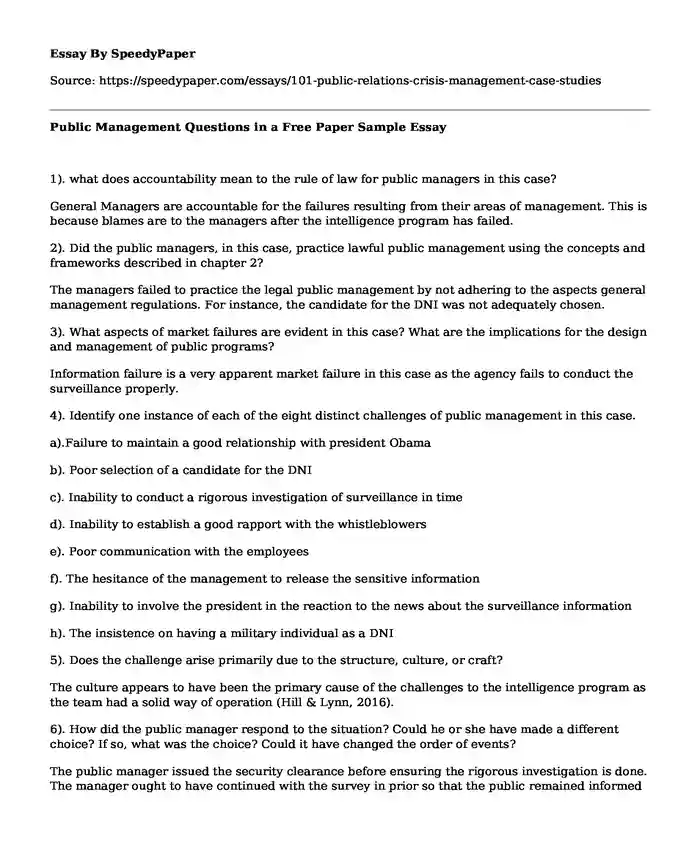
| Type of paper: | Essay |
| Categories: | Management |
| Pages: | 3 |
| Wordcount: | 700 words |
1). what does accountability mean to the rule of law for public managers in this case?
General Managers are accountable for the failures resulting from their areas of management. This is because blames are to the managers after the intelligence program has failed.
2). Did the public managers, in this case, practice lawful public management using the concepts and frameworks described in chapter 2?
The managers failed to practice the legal public management by not adhering to the aspects general management regulations. For instance, the candidate for the DNI was not adequately chosen.
3). What aspects of market failures are evident in this case? What are the implications for the design and management of public programs?
Information failure is a very apparent market failure in this case as the agency fails to conduct the surveillance properly.
4). Identify one instance of each of the eight distinct challenges of public management in this case.
a).Failure to maintain a good relationship with president Obama
b). Poor selection of a candidate for the DNI
c). Inability to conduct a rigorous investigation of surveillance in time
d). Inability to establish a good rapport with the whistleblowers
e). Poor communication with the employees
f). The hesitance of the management to release the sensitive information
g). Inability to involve the president in the reaction to the news about the surveillance information
h). The insistence on having a military individual as a DNI
5). Does the challenge arise primarily due to the structure, culture, or craft?
The culture appears to have been the primary cause of the challenges to the intelligence program as the team had a solid way of operation (Hill & Lynn, 2016).
6). How did the public manager respond to the situation? Could he or she have made a different choice? If so, what was the choice? Could it have changed the order of events?
The public manager issued the security clearance before ensuring the rigorous investigation is done. The manager ought to have continued with the survey in prior so that the public remained informed (Salminen, 2006).
7). What are the ethical responsibilities of the public manager in this case?
The public manager should thoroughly conduct surveillance properly to ensure every bit of information is obtained (Hill & Lynn, 2016).
8). Under what circumstance and to what extent is different to experts and expertise preferable to reliance on partisan and adversarial processes of deliberation and choice?
In this case, the public were the potential followers and who could be advisers. It becomes necessary to consider the attitude of the public towards the ongoing issue in the management.
9). What are the roles of different accountability institutions (described in Chapter 2) in this case? Were these systems effective in ensuring accountability?
President’s administration and the national security agency team were the potentials accountably institutions. They were not effective in ensuring accountability as they failed to conduct an appropriate surveillance (Salminen, 2006).
10). Consider the four types of the accountability systems identified by Romzek and Dubnik (discussed in chapter 2) hierarchical, legal, political and professional. What kind of accountability system was relied on, explicitly or implicitly, in this case? Were any of these systems particularly effective or ineffective?
Political accountability system dominated the case whereby most arguments were political. None of the systems was effectively utilized in this case (Romzek, 2000, pp. 21-44).
11). How should General Alexander be evaluated as a general manager?
The manager has failed in his duty for which he is accountable since the intelligence program has not achieved its mission.
12). Who-elected officials, senior political executives, professional staff, technical experts, should know what, when and how much in matters of national security? How should information be shared?
The professional staff is expected to sufficiently know what intelligence program entails in time so that sensitive information is always obtained. The surveillance team should gather the relevant information and inform the public when need be (Hill & Lynn, 2016).
References
Hill, C. & Lynn, L. (2016). Public management (1st ed., pp. 89-94). California: CQ Press.
Romzek, S. (2000). Dynamics of Public Sector Accountability in an Era of Reform. International Review of Administrative Sciences. Vol. 66(1), pp. 21-44.
Salminen, A, (2006). Accountability, Values and the Ethical Principles of Public Service: The Views of Finnish Legislators. International Review of Administrative Sciences 72(2), 171-185.
Cite this page
Public Management Questions in a Free Paper Sample. (2018, Feb 12). Retrieved from https://speedypaper.com/essays/101-public-relations-crisis-management-case-studies
Request Removal
If you are the original author of this essay and no longer wish to have it published on the SpeedyPaper website, please click below to request its removal:
- Free Essay in Psychological Science
- Essay Example on Plato's Republic
- Free Paper Sample with an Education Advocacy List
- Free Essay about the Effects of Domestic Violence on Nurses
- Essay Example on Health Information Technology Systems Life Cycle
- Essay Example on Social Construction of Gender
- Paper Sample on the Ethical and Moral Violations by Doctor Larry Nassar
Popular categories




